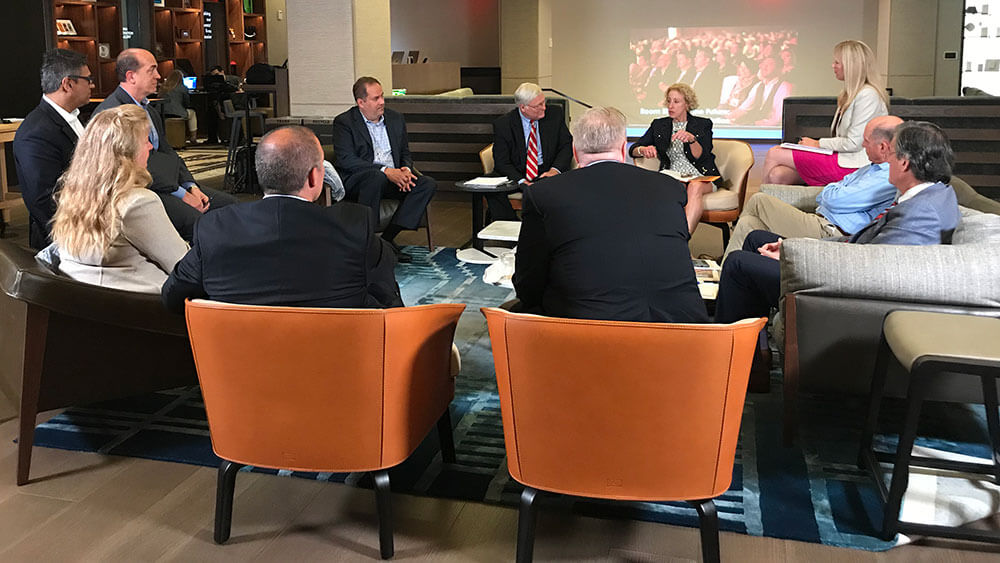
Study stakeholders discuss highlights of the “Room Block of the Future” research.
After event organizers manage to motivate attendees to register for a program, they face another — and arguably, more challenging — hurdle: getting them to book a room at one of the hotel properties in the official hotel block. You’ve got a lot of competition with Trivago offering “the ideal hotel room at the best price,” and every major hotelier promoting the benefits of booking direct.
A simple Google search yields plenty of results with convenient booking options, and Airbnb’s affordable alternative to the traditional guest experience continues to buzz in the minds of budget-conscious registrants. With this mile-long list of options, how many attendees are using the event- housing portal to make their reservations?

Mark Lomanno, a partner and senior adviser with Kalibri Labs, believes advertisements from travel discount companies resonate more with attendees than email alerts about convention housing.
Around 48 percent, according to the findings from “Room Block of the Future.” The study, conducted by Kalibri Labs and Prism Advisory Group — with funding from the PCMA Foundation, Hilton Worldwide, and NYC & Company — analyzed a mix of citywide conventions in Houston, New York City, and San Diego. In addition to combing through more than 2 million anonymous hotel and Airbnb guest records from 2015 to 2018, researchers surveyed 750 convention attendees to understand what factors went into their decision to book inside or outside the group room block.
Mark Lomanno, a partner and senior adviser with Kalibri Labs, was surprised to discover that an additional 23 percent of attendees actually stayed at hotels in the room block — it’s just that they made their reservations via a channel other than the event’s housing system. So while 71 percent of attendees stayed in the block, organizers may have received only credit for 48 percent.
“You assume that if someone is going to book outside the block, they’re going to stay at a different hotel,” Lomanno told Convene. “But these people were where they were expected to be. Organizers just may not have known it.” (Some planners include contract clauses stipulating that they can ask for an audit comparing their registration lists with hotel guests, so that they get credit for rooms booked by their attendees outside the room block, but still within the hotel.)
If hotels and organizers are working together to offer exclusive discounted rates, why would attendees book elsewhere? The survey shows that messages from spokespeople like William Shatner at Priceline and Captain Obvious at hotels.com are resonating more than email reminders from event organizers. In fact, 39 percent of attendees who stayed in the block but didn’t book via the host organization believed that the event-housing system’s rates were more expensive than what they could find via their own searches.
“The organizer is only communicating to attendees on one level. Online travel agencies use a range of communication channels,” Lomanno said, including television, social media, and print advertising. “The attendee who doesn’t travel all the time will assume that the best rates are available some- where else because they’re hearing that claim a lot.”
Money, however, is not the only deciding factor when it comes to booking rooms. Lomanno pointed out that many attendees want to make sure that they earn their loyalty points at their preferred hotel brands or book a particular type of hotel room — two features that may not be available via the event’s housing system. “For a lot of these attendees, the money isn’t coming out of their [own] pockets,” Lomanno said. “It’s coming from their company. So paying a few more dollars to get the exact room you want or to make sure you accumulate your loyalty points doesn’t matter.”
Lomanno highlighted that the first phase of the research aimed to understand “what attendees did and why they did it.” Now, the plan for phase two includes broadening the number of perspectives. “We’re going to ask some different questions now that we have a solid foundation of what’s really happening from an attendee’s point of view,” Lomanno said. “We’ll talk to event organizers, hotel executives, housing groups, and other event stakeholders to get a real idea of how to build the room block of the future.”
David McMillin is an associate editor at Convene.
Register for EduCon
How can you best plan for today’s attendee booking decisions? Mark Lomanno and Elaine Hendricks will lead a 2019 PCMA EduCon session allowing you to dive into the research discussed in this story. Sign up today on our EduCon site.
Share Your Thoughts
Attendees Want to Know: What’s in it for Me?
Some organizers include language in their meeting marketing materials that underscores the important role that booking in the block plays in the organization’s financials — and therefore the quality of experience the event offers — but the initial findings of the research revealed that average attendees are more focused on their own bottom lines. Clearly articulating that the attendee rate is the lowest available is one way to help convince attendees to make in-the-block reservations, according to the study. Here are three other compelling incentives the research identified as being highly motivational.
- Special hotel-related offers such as extra dining dollars appealed to 58 percent of respondents.
- Fifty-six percent wanted a discount applied to their registration fees.
- Fifty-one percent were won over by special conference-related offers, like invitation-only networking opportunities.
Analyzing the Next Generation of Accommodations
Event organizers are grappling with the attitudes and expectations of millennials and Generation Z attendees when designing the on-site experience, but it appears that learning styles and networking needs aren’t the only things to which they need to pay attention. The initial findings of the room block research revealed that younger attendees have a different approach to booking hotels, too. Fifty-nine percent made their reservations outside of the traditional conference hotel room-block channel.
“Someone over 40 is much more likely to go through the traditional booking process,” Kalibri Labs’ Mark Lomanno told attendees at a Convening Leaders 2019 session. “What we don’t know is whether the under-40 group will become more traditional as they get older, or if it’s a behavior that they will stick with moving forward. When thinking about the room block of the future and how to make the guest experience better, this is something to consider and something to further study.”
Read our previous story: “Making Sense of Room Block Decisions”.
TEST TIME
- Earn one clock hour of certification credit by reading this story and sidebars (links below), and by brushing up on your negotiation skills by reading “Ten Tips for Negotiating in 2019,” by Ed Brodow.
- To earn certification clock hours, visit our CMP Series page to answer questions about information contained in this CMP Series article and the additional material. If the latest quiz isn’t posted, please return at a later date.
The Certified Meeting Professional (CMP) is a registered trademark of the Events Industry Council.
